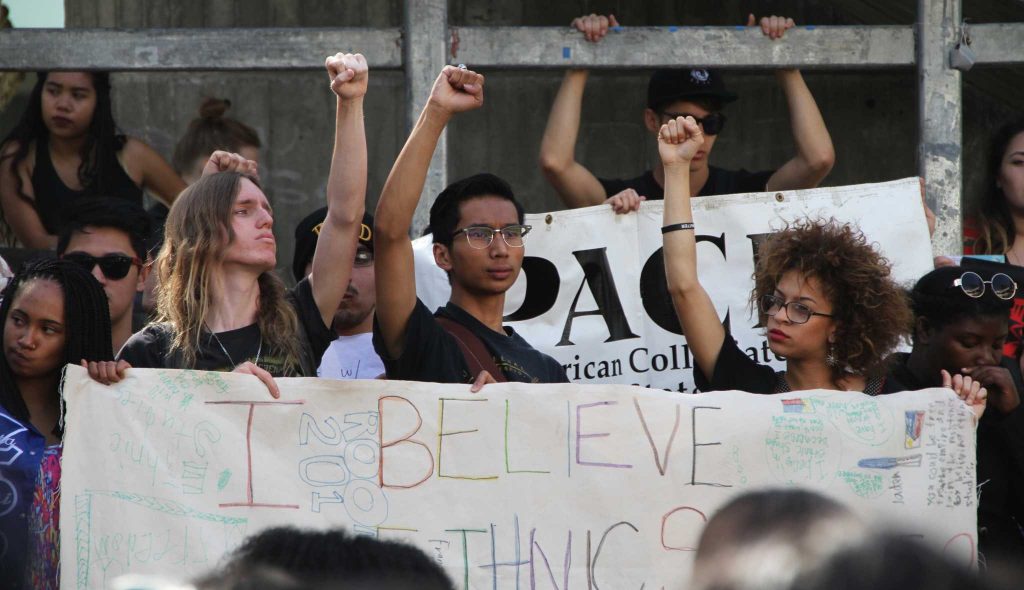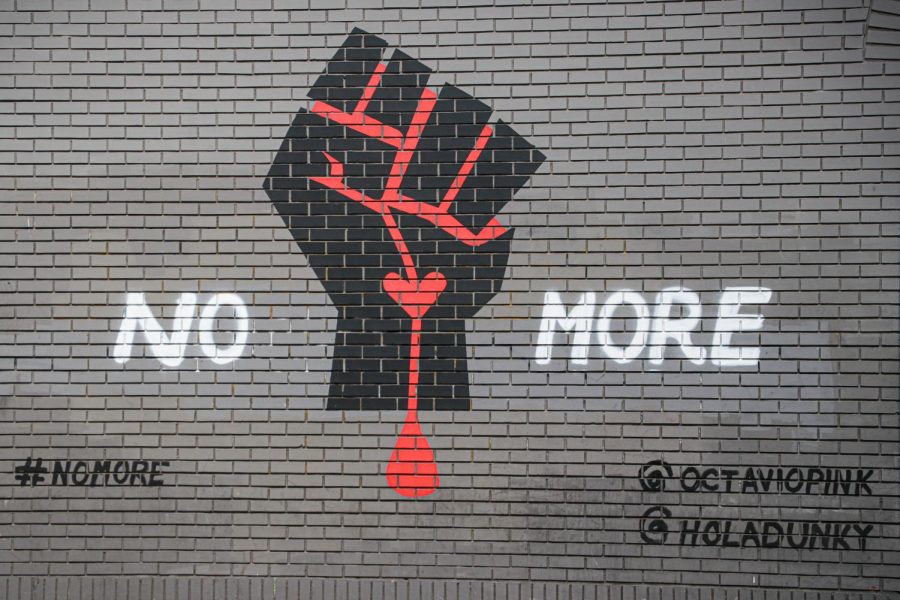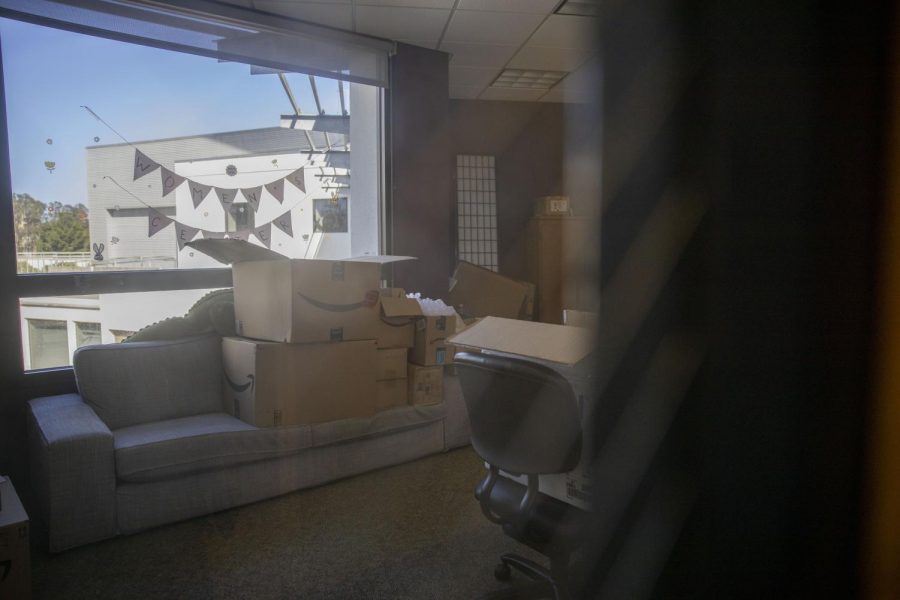[slideshow_deploy id=’70842′]
Students clad in black and red hurried around the halls of the Ethnic Studies and Psychology Building early Thursday morning with flyers still warm from the printer, as they rushed to post them across campus and spread word to the student body about a meeting with President Leslie E. Wong being held in just a few short hours.
“Get those flyers up in the Student Center!” shouted Sofia Cardenas, one of the main organizers, to a couple of students with red bandanas tied around their arms. “We need them everywhere students can see them!”
The urgency came as the result of a last-minute change to the room where the meeting between Wong and students and faculty from the College of Ethnic Studies would take place.
“We’re marching from here to the Seven Hills Conference Center because Wong thinks he can change the room without telling us,” Cardenas later told the buzzing crowd of hundreds gathered in front of Ethnic Studies. “But we’re here to tell him that he can’t get away with that, and he can’t get away with taking away our school!”
The meeting, which began at 9 a.m. and ran until 11 a.m. provided students and faculty with the opportunity to present their list of demands to Wong, Vice President of Administration and Finance Ronald Cortez, and Provost Sue Rosser.
Shannon Deloso, Ethnic Studies representative for Associated Students, Inc., opened the meeting with strong words for Wong and his fellow administrators regarding potential spending cuts to the college.
“It is not an overspending problem, it is the underfunding provided by your administration,” Deloso said.
Wong began by first thanking students for offering their voices in support of the College of Ethnic Studies.
“It warms my heart,” Wong said. “It reconnects me back to when I was 18 years old and supporting my friends who led the strike and were participating in it back (in 1968).”
Wong also reminded students that nothing about the spending cuts was finalized yet.
“The governor hasn’t issued the budget for next year, and I hope you will join me to meet with him about our budget,” Wong said.
Within an hour, the courtyard in front of Ethnic Studies was flooded with students, faculty and other members of the community, many wearing black with red accessories in solidarity with the potential faculty strike in April. Peppered among the sea of black and red were white signs and banners with messages of unity.
“I’m with an organization called Manilatown Heritage Foundation, and back in 1977, there was a big tenant struggle for housing rights in San Francisco, and SF State students from the Ethnic Studies College were instrumental in helping us win our fight,” said Manilatown Heritage Foundation Board President Tony Robles. “I’m here now to support the Ethnic Studies program because they’re home.”
Robles’ sentiment was shared by many of the students and faculty who felt that Ethnic Studies was an irreplaceable community for those who had previously felt lost both at SF State and at school in general.
“Ethnic Studies is the reason that I’m still in school,” said Black Student Union Vice President Hanna Wodaje. “It’s the reason why I’m able to graduate, and it’s the reason why I’ve decided to pursue my education and take it seriously, when in other classes I felt ignored and silenced and marginalized.”
“My education taught me how to be a leader, how to be a father, how to be (a part) of the community,” said Latina/Latino studies major Oscar Peña.
The crowd broke out into chants led by Cardenas and Peña, who raised their fists in the air and shouted, “What do we want?” The enthusiastic group thundered back, “Education!”
In the final minutes leading up to the march to the conference center, students hung signs with messages like, “Education is a human right,” from their necks, linked arms and formed a wall blocking the path from other students, who were looking at the protest with mixed curiosity and annoyance.
“Can we join?” one student asked, and the electrified crowd cheered its approval, parting to allow the new members in. The passion demonstrated was potent, and impressed Terry Collins and Alfred Wong, who participated in the famous, five-month strike in 1968 that resulted in the creation of the College of Ethnic Studies. The BSU, of which Collins was a member, and the Third World Liberation Front, of which Alfred Wong was the chairman, led the strike. The two remarked on the similarities between the protests and found the students’ emotion moving.
“On the one hand, I feel very sad that after 45 years of operation they constantly whittled down and tried to get rid of the College of Ethnic Studies,” Alfred Wong said. “On the other, I’m really happy that they students are aware of this and demanding the changes to maintain what we have started.”
“It’s fantastic; it’s beautiful,” Collins said. “I think what’s going on right now is fantastic, but they got to understand: This is a long struggle. It’s going to take a whole lot of time. And we have to be consistent.”
Dean of the College of Ethnic Studies Kenneth Monteiro was also impressed with students’ efforts.
“I was absolutely amazed by the organizing skills and intellectual skills of the students who spoke today,” Monteiro said. “Today’s meeting was well beyond my expectations in terms of student turnout. … This was SF State at its best.”
Wong didn’t immediately acknowledge the list of student and faculty demands that were announced toward the beginning of the meeting, including a call for the immediate restoration of all pre-2007 funding to the College of Ethnic Studies, full disclosure and transparency of the entire University budget, increased funding allocations for lecturers and a requirement that all incoming students complete at least one lower division and one upper division course in Ethnic Studies as a prerequisite for graduation.
After students continued to ask that their requests be recognized, Wong agreed to address the list of demands presented to him in Thursday’s meeting by February 29. Students demanded their needs be met by this date in order to honor the end of Black History Month.
Following Wong, Provost Sue Rosser issued a statement regarding cuts put in place by the CSU system in 2008. She continued to describe the financial situation of the University when she was appointed to her position seven years ago.
“I arrived and immediately found out that budgets were in complete disarray – my predecessor was forced to cut 10 percent across the board, and of course in our first paychecks we all experienced the 10 percent cut as well,” Rosser said, referencing the furlough days that faculty, staff and administration took at the time.
Immediately following her statement, the room, which was so full that some attendees were forced to watch from the courtyard outside, erupted in groans of disagreement.
“We have tried very hard over the last seven years that I’ve been here to crawl out of the budget hole in which we found ourselves,” Rosser continued. “All academic affairs has suffered, Ethnic Studies has suffered, but so have the other five colleges. … Each college has its own challenges, differences, and opportunities.”
Wong touched on some of those challenges in an earlier statement.
“We need a new level of transparency,” Wong said. “I am asking each of the college deans to form a budget advisory committee composed of faculty, staff and students.”
In addition to his plan for several budget advisory committees, Wong also informed students and faculty that the University would increase its spending allotment to Ethnic Studies by $200,000 in 2016-2017 in order to “allow planning” by the faculty, staff, students and dean of the College of Ethnic Studies.
“I do not want to proceed with academic budgets as they are now configured and distributed,” Wong said.
Ethnic Studies lecturer Larry Salomon was optimistic that the meeting proved to administrators the students’ dedication to their college.
“President Wong’s been here for a few years now, but this is the first time he’s really met San Francisco State,” Salomon said.
Race and resistance studies department Chair Jason Ferreira added that the influence of the College of Ethnic Studies reaches far beyond the campus community.
“I don’t think that they fully realize that when they mess with SF State’s Ethnic Studies, they’re not just messing with the classroom, they’re not just messing with the students – they’re messing with the Mission, they’re messing with the Western Addition, they’re messing with Bayview Hunter’s Point … and the community that is here, in the forms of the students and in the forms of these people,” Ferreira said.
Sophia Wenzel, the vice president of the Ethnic Studies Student Organization, noted that the work isn’t over and encouraged continued student involvement.
“Students that want to help can sign our petition, which is online; follow our Facebook page, which is Defend Ethnic Studies across the CSU, and spread the word on social media using the hashtags #defendethnicstudies and #stoptheassault,” Wenzel said.
The petition, which was created Tuesday, has since exceeded its goal of 3,500 signatures.
With only minutes left before the meeting ended, protest organizers urged the crowd outside to link arms and form a human path through which Wong and the other administrators were forced to walk. As the stone-faced Wong exited the meeting, the line of students chanted, “Shame on you!” From there, the protesters marched through campus, chanting, cheering and waving to onlookers before reaching Malcolm X Plaza for a follow-up demonstration.
The crowd overwhelmed the quad, raising their fists and crying out messages of encouragement to the dozens of organizers who flocked to the stage. Among the statements made by those who took the stage were messages of solidarity with Palestine, remembrance of various victims of police brutality and a rejection of the colonialist and imperialist attitudes they accused the administration of having. Most important was the steadfast commitment to the College of Ethnic Studies, no matter the cost.
“We have nothing to lose but our chains!” hundreds of students chanted. “We have nothing to lose but our chains!”






